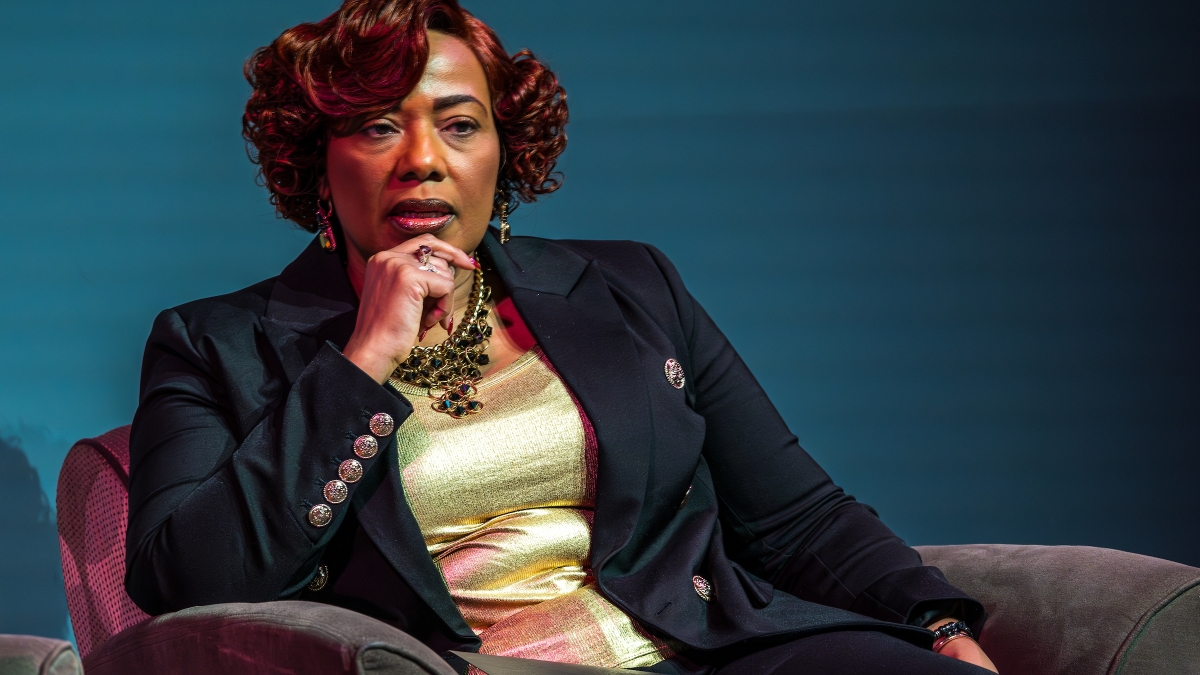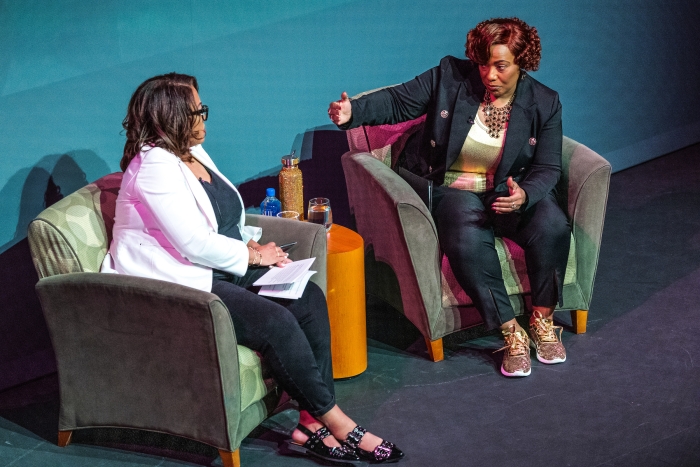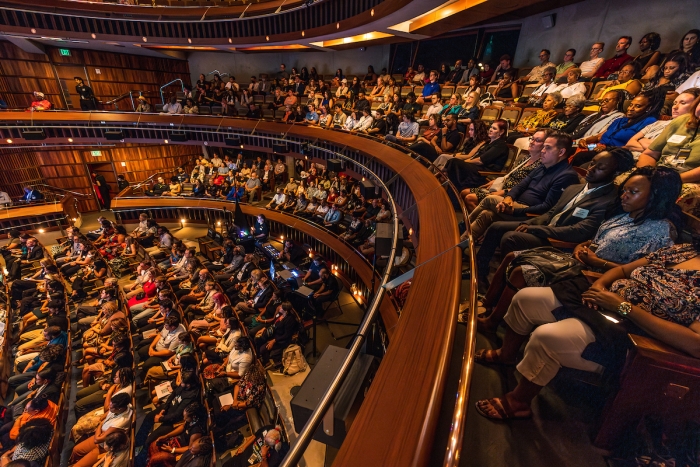MLK's daughter continues work honoring her father's legacy

Bernice A. King, the youngest daughter of Martin Luther King Jr., was the featured speaker at the 2024 Flinn Foundation Centennial Lecture at the Tempe Center for the Arts on Tuesday, Oct. 1. Their topic of conversation was “Building History: Continuing the Legacy of Dr. Martin Luther King Jr.” The event was co-sponsored by Barrett, The Honors College at ASU. Photo by Charlie Leight/ASU News
Shortly after she sat down on the Tempe Center for the Arts stage Tuesday night, Bernice King was asked about a speech her father gave at Arizona State University 60 years ago.
Martin Luther King Jr.’s June 3, 1964, oration — titled “Religious Witness for Human Dignity” — was held at Goodwin Stadium, then the home of ASU’s football team, and delivered just days before the Civil Rights Act was passed by the U.S. Senate.
Bernice King, CEO of the Martin Luther King Jr. Center for Nonviolent Social Change, reflected on the speech — and that time in history — during the 2024 Flinn Foundation Centennial Lecture. The event, titled “Building History: Continuing the Legacy of Dr. Martin Luther King Jr.,” was co-sponsored by ASU’s Barrett, The Honors College.
“When he came to this university, he did not enjoy the benefits of legal equality,” Bernice King said. “Sixty years later, his daughter does. That does not mean that we don’t have a lot of difficult work to do and that there aren’t challenges. But I just think of the fact that my father lived in a very black-and-white world and was surrounded by signage that said, ‘Black here, white here.’
“I don’t live in that kind of world. My father, my mother and those that worked under their leadership worked very hard and sacrificially to ensure that a major foundation was laid in civil rights so that perhaps we would never have to return fully to those days.”
Bernice King and Candi Castleberry, Amazon’s vice president of inclusive experiences and technology, engaged in a nearly hour-long conversation about equality, the progress that’s been made in the last 60 years and the challenges ahead.
King said the greatest positive change she’s seen is in politics, noting that in the 1960s there were a “token number” of Black elected officials. By comparison, King said, 12% of current congressional members are Black, reflecting on the fact that 13.6% of the U.S. population identifies as Black, according to the latest U.S. Census data.
But, King said, there has not been as much progress economically.
“There’s still an extreme racial wealth gap in this country,” she said. “Poverty is just as bad, if not worse than it was during my father’s lifetime. We have a lot of work to do to dismantle the biases that people carry on a daily basis and are continuing to manifest ... in a lot of our systems and structures that cause these racially disparate outcomes.”
King said it’s vital that today’s civil rights activists continue to follow her father’s belief in nonviolence, saying that “You can’t use hate to destroy hate. Only love can do that.”
“I know it’s not easy because we have triggers. But we have to learn how to manage our triggers if we’re going to transform things,” she said. “Because if you’re hurling insults just because somebody else is hurling insults — to what end? It feels good when you tell somebody off, it feels really good, but it doesn’t accomplish anything. It doesn’t move the needle. And when you’re trying to get change from people who are in positions to make the change, you don’t want to (tick) them off.”
King said her father also had a “spiritual foundation” in his work.
“The value of all human life was important him, even his adversaries,” she said. “He still saw them as his sister and brother, regardless of what they did. So he was able to maintain his level of dignity, morality and spiritual strength and not allow them to pull him down to their level.”
Technology — and in particular, social media — has made it harder to galvanize people today, King said. So many different people have a voice on so many different platforms that it’s difficult to create an agenda of what should come first, second and third, or come together around a single voice.
“My father just happened to be the brilliant spokesperson who could not only articulate the issue for the Black community but also for the broader community,” she said. “That’s a challenge today because who is articulating holistically around position? Everybody has these different platforms. If you have several people who have spokesperson ability, they need to corral their forces and create a platform to articulate the issues with one voice, and that’s a challenge. We don’t have that centralized leadership.”
King spent several minutes talking about her mother, Coretta Scott King, the contributions she made to the civil rights movement, her work in getting the Martin Luther King Jr. Center for Nonviolent Social Change off the ground and how her calls for peace calmed the nation following Martin Luther King Jr.’s assassination in 1968.
“When he passed, he was one of the most hated persons in America,” King said. “Now he’s one of the most loved persons in the world. People look to him for guidance, and for his teachings and writings. That’s because (my mom) did the work to keep it together.
“Had she not had the posture she had when he was assassinated, there’s no telling what would’ve happened to our world. There were riots going on all over the nation. But she called for nonviolence. She called for peace and she called for forgiveness.”
Near the end of their conversation, Castleberry relayed a question from an audience member who wanted to know if King feels the pressure of continuing her father’s legacy.
King said she was once burdened by the weight of those expectations, but now she welcomes the opportunity.
“I know how important his work is to our world,” she said. “It doesn’t mean I don’t get frustrated in this process when I see the way our world is going. That’s where the pressure comes from. How do I, in my small way, reach people with these powerful teachings?
“So, that’s the pressure. But to carry it? Not anymore. I don’t resent that anymore.”
More Arts, humanities and education
AI literacy course prepares ASU students to set cultural norms for new technology
As the use of artificial intelligence spreads rapidly to every discipline at Arizona State University, it’s essential for students to understand how to ethically wield this powerful technology.Lance…

Grand Canyon National Park superintendent visits ASU, shares about efforts to welcome Indigenous voices back into the park
There are 11 tribes who have historic connections to the land and resources in the Grand Canyon National Park. Sadly, when the park was created, many were forced from those lands, sometimes at…
ASU film professor part of 'Cyberpunk' exhibit at Academy Museum in LA
Arizona State University filmmaker Alex Rivera sees cyberpunk as a perfect vehicle to represent the Latino experience.Cyberpunk is a subgenre of science fiction that explores the intersection of…

